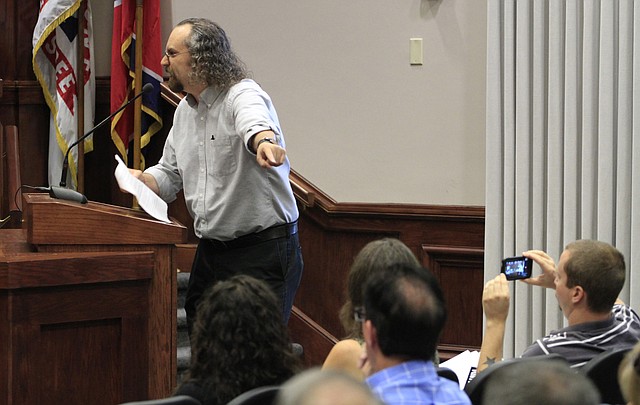Hamilton County Commission formalizes prayer policy
Friday, January 1, 1904
WHAT'S NEXT?Judge Harry S. "Sandy" Mattice will hold a July 26 hearing to consider whether to grant a preliminary injunction to halt the prayers until he can rule on the federal lawsuit over prayer at commission meetings.
Without any open discussion, Hamilton County commissioners unanimously approved a new policy Tuesday, formalizing their long-standing practice of allowing public prayer at meetings.
The new policy has county staffers compiling a central database of religious congregations "with an established presence in Hamilton County." From that list, religious leaders will be invited to lead prayers before weekly commission meetings. Slots will be filled on a first-come, first-served basis.
Officials said the policy will ensure diversity of religious representation. Drafted by Commissioner Jim Fields and county legal staff, it states that participation in the prayer is voluntary and that the speaker cannot proselytize or seek to advance any particular faith nor disparage the religious faith or nonreligious views of others.
The invocation can be a "prayer, reflective moment of silence, or a short solemnizing message," the policy says.
The policy prompted strong emotions Tuesday as audience members voiced their support and disapproval during the public comments portion of the meeting.
"Each one of you are heroes in Hamilton County," Mark West, president of the Chattanooga Tea Party, told commissioners after their vote. "Because not only do you reflect the values of your community in voting for this resolution today, but you're also reflecting the values of our founders and you are in essence defending our U.S. Constitution."
Others thought the commission's move overreached the body's duties and inappropriately endorsed Christianity.
"This is pure propaganda," said Tommy Coleman, waving a copy of the seven-page policy document. "We have a three-word policy that is all inclusive and legal. It's called 'moment of silence.'"
Coleman and Brandon Jones are suing the commission in federal court over its continued use of Christian prayer at meetings. The two say the prayers violate the First Amendment's Establishment Clause forbidding the government from endorsing any specific religion.
Before filing the suit, the men asked commissioners to hold a moment of silence instead of prayers, but the body moved forward with its practice of inviting local ministers to the podium to lead the invocation.
Armed with the list of religious congregations, County Attorney Rheubin Taylor said, employees will start sending out invitations as early as this week to enact the policy as soon as possible. To make the list, staffers will use the phone book and online congregation listings, as well as those kept by local groups and foundations, Taylor said.
If there are questions over the legitimacy of a religious congregation, employees will rely on whether the group's nonprofit status has been approved by the Internal Revenue Service.
"They're going through everything to make it as inclusive as possible," Taylor said after the meeting.
Taylor asked commissioners to not comment publicly or to keep comments limited at Tuesday's meeting because of the pending litigation. None spoke about the policy, but all voted in favor of it.
Before turning over the microphone to public comments, commissioners wished each other and audience members a good holiday and reminded them to be thankful of their personal freedoms.
Several spoke about the nation's founding fathers, and Commission Chairman Larry Henry put the issue of faith front and center.
"I think about the faith of our fathers before us that have gone on and fought in wars and the nationalistic spirit that they had," he said. "And I certainly hope that we can regain much of that during this generation and in the generation to come."
Those speaking in favor of public prayer tied together the ideals of patriotism and religious faith and cited the religious faith of the nation's founders.
Both sides had different views on the separation of church and state and, at one point Tuesday, representatives on both sides of the issue alluded to the Constitution in their arguments.
Clifton Burris asked commissioners to think and pray about the purpose of their faith.
"After all, how many souls has the commission meeting saved?" Burris said. "Whose responsibility is it to make the Gospel heard?"
After the meeting, Burris, who described himself as a nondenominational Christian, said Christians should be about uniting people, not alienating them. He warned against government bodies aligning themselves with particular religions.
"Jesus never had that luxury. The government chased him down. The early church was persecuted," he said. "I'm not saying I want that to continue. All I'm saying is Christians should be more suspicious when the state takes it as their own."
